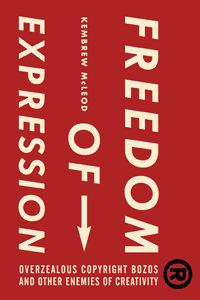
We’re living in an age of intellectual-property rights run amok. Royalty collectors threaten to sue Girl Scout troops for dancing the Macarena. Textbook publishers nix excerpts of Martin Luther King Jr.’s “I Have a Dream” speech because they can’t afford to buy the rights from his heirs. Donald Trump trademarks not just the phrase “You’re fired!” but also his accompanying hand gesture, commonly known as pointing.
The problem here is greed, asserts Kembrew McLeod in this smart, amusing examination of the increasingly grubby clash between private property and free speech. McLeod, a professor, music critic, and prankster, has no objection to inventors and artists protecting their creations. Rather, he’s against the impulse to stake a claim on everything we read, sing, and hear. Laws originally intended to prevent plagiarism and theft are now being wielded “like a weapon” by corporations that think they can own things like hand gestures, dance moves, or musical notes. Such claims, he argues, “mock the idea of democracy, and they step on creativity.”
The music industry’s iron-fisted crackdown on sampling particularly irks McLeod, who sees the practice as the logical next step in the age-old musical tradition of borrowing. Things have gotten so out of hand that to pen a parody of “This Land Is Your Land”—a communalist anthem whose melody was openly cribbed from another musician—is to invite a lawsuit. Just ask the Internet cartoonists who used the Woody Guthrie tune in a satirical short about the 2004 campaign; the duo soon found themselves fighting off music-publishing executives’ lawyers.
To highlight the danger to free speech posed by copyright abuse, the mischievous McLeod actually trademarked the phrase “freedom of expression.” When AT&T then used “his” phrase in an ad without permission, McLeod feigned indignation—and threatened to sue.
Of course, when such suits actually reach a court of law, they can backfire. When Fox News sued Al Franken for satirizing its catchphrase “fair and balanced,” a judge literally laughed the case out of court. Eventually, McLeod argues, frivolous legal threats will only encourage more unauthorized appropriation. After all, he writes, “copyright bozo zealotry” has already bred a new army of fair-use activists.















